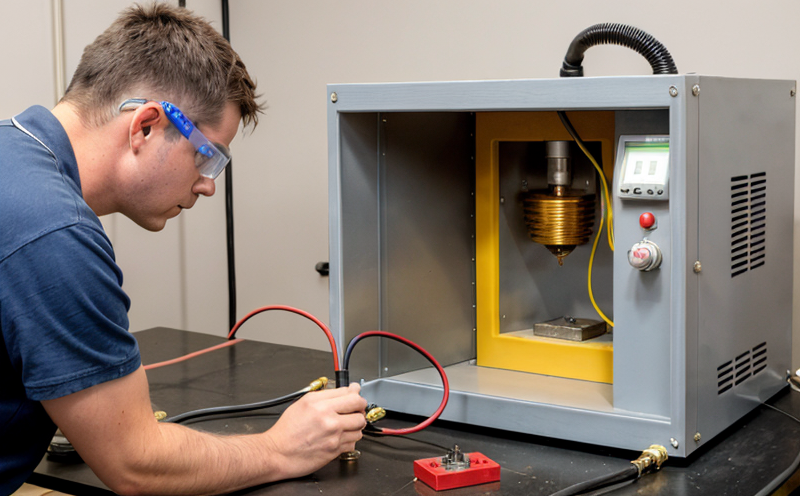ASTM E1004 Electrical Conductivity Testing by Eddy Current
The ASTM E1004 standard provides a methodology to determine electrical conductivity of ferromagnetic materials using eddy current techniques. This testing technique is particularly useful for quality assurance, research and development, and procurement activities in metallurgy and material science. The process involves generating an alternating magnetic field that induces currents within the test specimen, which are then analyzed to calculate the electrical conductivity.
The eddy current method is non-destructive and can be used on a wide range of materials including steel, iron, nickel alloys, and cobalt alloys. It provides rapid results with high repeatability, making it suitable for both routine inspections and detailed analysis in research laboratories. The technique relies heavily on the material's magnetic properties, which allows for accurate measurement without causing damage to the sample.
For specimens that are not fully ferromagnetic but have a significant iron content, ASTM E1004 can still be applied with appropriate calibration adjustments. This makes it versatile enough to handle various alloy compositions commonly encountered in industrial settings. The accuracy of the measurements depends largely on the homogeneity and uniformity of the magnetic properties across the sample.
The testing procedure typically involves placing the specimen into a coil that generates an alternating current, causing eddy currents within the material. These currents interact with the external field to produce measurable signals whose amplitude correlates directly with the electrical conductivity of the tested material. Advanced software tools are used to process these signals and convert them into quantitative values.
Proper preparation of the specimen is crucial for obtaining reliable results under ASTM E1004 guidelines. Surfaces must be clean, free from rust or paint, and any surface treatments should ideally be minimized unless specifically accounted for in calibration procedures. Calibration standards are essential to ensure consistency across different tests and operators. Regular verification against known reference materials helps maintain the accuracy of the measurements over time.
Understanding the limitations of ASTM E1004 is important when interpreting results. Factors such as grain size, microstructure, and composition can influence how well eddy currents behave within a material, affecting conductivity readings. Additionally, significant variations in temperature or humidity may also impact test outcomes, necessitating controlled environmental conditions during testing.
In summary, ASTM E1004 offers a robust approach for assessing electrical conductivity using eddy current techniques. Its non-destructive nature and ability to handle diverse materials make it an invaluable tool in quality control processes across various industries.
Benefits
The use of ASTM E1004 Electrical Conductivity Testing by Eddy Current brings several advantages, especially within the metallurgy sector. Firstly, it allows for rapid assessment of electrical conductivity without destroying the sample, which is crucial for maintaining valuable assets. Secondly, this technique provides high repeatability and precision, ensuring consistent results across multiple tests or different facilities.
Moreover, ASTM E1004 supports continuous monitoring of materials during production processes, enabling early detection of anomalies that could indicate quality issues. This proactive approach helps reduce costs associated with rework or scrapping substandard products. In R&D environments, it facilitates exploration into new alloys and their properties by providing reliable data points.
For procurement departments, ASTM E1004 ensures compliance with specified material specifications, helping to select suppliers who deliver consistently high-quality materials. The non-destructive nature of the test also supports sustainability goals by minimizing waste generation during quality checks.
In conclusion, adopting ASTM E1004 enhances overall operational efficiency while promoting product excellence and regulatory adherence.
Industry Applications
The application of ASTM E1004 Electrical Conductivity Testing by Eddy Current spans multiple industries where electrical conductivity plays a critical role in material performance. In aerospace manufacturing, for instance, precise knowledge about the electrical properties ensures that components meet stringent safety standards.
In automotive production, this testing method helps verify the integrity and reliability of key parts like engine blocks or transmission housings made from complex alloys. Similarly, in medical device fabrication, accurate measurement of conductive qualities guarantees biocompatibility and operational efficiency. For electronics manufacturing, it aids in ensuring that connectors and circuit boards are free from defects that could affect performance.
Furthermore, ASTM E1004 is valuable in academic research focused on developing novel materials with tailored electrical characteristics. This includes investigating superconductors for energy applications or conducting studies on corrosion resistance of stainless steels used in marine environments.
The versatility and precision offered by this standard make it indispensable across numerous sectors requiring stringent quality assurance measures.
Eurolab Advantages
At Eurolab, we offer comprehensive services aligned with ASTM E1004 standards for electrical conductivity testing using eddy current techniques. Our expertise spans from initial consultation through to final reporting, ensuring clients receive tailored solutions that meet their specific needs.
We employ state-of-the-art equipment calibrated according to international standards like ISO 9001:2015 and ASME V-2017 for utmost accuracy. Our skilled technicians undergo rigorous training to maintain proficiency in operating these advanced systems effectively.
Our commitment to client satisfaction extends beyond just meeting technical requirements; we also provide detailed reports backed by comprehensive documentation supporting each test performed. This transparency fosters trust between us and our clients, allowing them peace of mind knowing their samples are handled with care at every step.
In summary, Eurolab prides itself on delivering top-tier service in ASTM E1004 electrical conductivity testing by eddy current, backed by years of experience and unwavering dedication to excellence.





